Blue
Blog: What does school readiness look like?
School readiness is always a hot topic at this time of year, but especially now as the early years Covid cohort starts to transition into primary school. Many of these children will have spent a large proportion of their childhood in lockdown, missing out on the opportunity to socialise with their peers and develop key skills. A recent survey conducted by YouGov suggested that half of all children are not ready to start school, and in some settings that has risen to 90%.
But what does being 'school ready' actually mean? A few years ago Ofsted (who inspect schools and children's services in England) released a list of skills that would be helpful for children to have before starting school - and parents may be surprised to learn that phonics, writing and maths are not on the list.
Here are some of the skills that are useful to practise with your child in everyday life:
I can sit still and listen
Schools don't expect children to sit still and listen for the whole day - that's hard even for grown ups - but developing listening skills is essential to communication, play, keeping safe and developing thinking and concentration skills. Model good listening with your child, chat with them and really listen to their responses. In order to become a good listener, children need to know what it feels like to be listened to.
I am aware of other children
Relationships with the people around us are so important and children learn a lot about appropriate behaviour and 'rules' which can help them get on with others. Children learn from everyone! Watch your child next time they play with others and talk to them about how they interact with their friends. Relationships are at the heart of leaning, whether it's in the playground or in the classroom.
I can talk in sentences and I can speak to an adult to ask for help
Talking helps children to develop their thinking and builds confidence - children get better at it when they have somebody who joins in, talks, listens and tries to understand. This confidence will seep into other areas: asking for help, communicating with friends and expanding language.
I am potty trained and can go to the toilet
Everyday activities encourage children to learn how to look after themselves. Routines such as using the toilet, wiping, flushing, pulling pants up and washing hands is a sequence which can be repeated again and again. This in turn grows independence, and will save you - and school staff - a lot of time in the bathroom. If there is a part of the sequence that a child is struggling with, such as remembering to flush, it's worth breaking the routine down and focusing efforts on helping them master that particular part.
I can recognise my own name
Names are a core part of our identity and using children's names in a positive way builds confidence and self esteem. Help children to recognise their own name by celebrating it! Make name placemats for dinner or write it in bubble writing and get them to decorate it - the added bonus is that having fun together with your child's name shows them that they are important.
I can open and enjoy a book
Have you ever had to read your child's favourite book over and over again? This familiarity with language, characters and pictures breeds confidence and encourages children to become 'readers' themselves. Knowing what happens next, joining in with the re-telling (made up or from memory, rather than reading the text themselves) and being able to name familiar things in pictures gives children a real sense of achievement. It's an important building block in learning to read and will spur them on to open, and enjoy, new books as well as old favourites.
I can understand the word 'No' and the borders it sets for behaviour, and I understand the word 'stop' and that such a phrase might be used to prevent danger
Children sometimes struggle to put into words what they are feeling, so their feelings come out in their behaviour. Support and encouragement is important, as is staying safe. Talk to your child about how words such as 'stop' may be used to keep them out of danger - explore songs and stories which will communicate this in a positive way.
I can take off my own coat and I can put on my own shoes
Life skills such as taking off a coat and putting on shoes are often the first big steps towards independence for young children. We do these everyday tasks without thinking but children need us to break it down into chunks for them to be able to grasp them. Time and patience are needed here, and maybe a little bit of fun too. Have you ever seen the coat flip? Look it up, it's genius!
Making these skills a part of daily life will help with the transition into school, and the familiarity of these tasks will underpin confidence at the start of the school journey. If your child isn't at this stage yet, do not worry - teaching and support staff will be there to encourage and help all children.
If you are a Peep practitioner then log into your Members area and search transition or school readiness - you will find Peep resources to support each of the skills listed above.
Blog: What does school readiness look like?
Feature box colour:
Side Quote Color:
blog: Ayrshire College leads with innovative early years offer
 Ayrshire College are leading the way with an innovative Early Years offer to students which includes the opportunity to support Peep delivery alongside Peep-trained Lecturers. The focus within further education training for early years is child-centred, and Peep offers a practical solution which equips students with the skills to work with parents and carers alongside the child, something the sector have been trying to find a way to include for some time.
Ayrshire College are leading the way with an innovative Early Years offer to students which includes the opportunity to support Peep delivery alongside Peep-trained Lecturers. The focus within further education training for early years is child-centred, and Peep offers a practical solution which equips students with the skills to work with parents and carers alongside the child, something the sector have been trying to find a way to include for some time.
Lecturers at Ayrshire College identified a gap in learning opportunities for students who wanted to improve their skills and experience in communicating and engaging with parents, alongside working with children. The Peep Learning Together Programme (LTP) was considered the most effective learning tool for strengthening these skills. Lyndsey Pack, Curriculum Manager for Early Years Education at Ayrshire College explains: ‘Initially, Peep offered us an opportunity for our students to plan and deliver weekly sessions with the involvement of children and families. This was crucial for them to achieve the assessment criteria around 'Play for Children and Young People' and build a portfolio of play experiences based around their Peep sessions. However, over the past few years, it has grown into so much more. The students increase their confidence in the context of family learning which is invaluable to them, parents and carers and children alike. They also develop crucial softer skills such as communication and active listening as well as reflection, evaluation and planning.’
College lecturers became Peep practitioners assisted by ELC students, to support families...
Lecturers became Peep practitioners, and SCQF Level 6 Early Learning and Childcare (ELC) students assisted in the delivery of Peep sessions, which ran every week on each of the main Ayrshire College campuses. These sessions were well attended by parents, carers, childminders and grandparents. The students gained hands-on experience, as well as an insight into the benefits of family engagement. Student Megan comments ‘Peep gave me an amazing opportunity to plan and implement activities for children and their families. One activity in our Peep session was making musical instruments from household items. It was a huge success with the children and demonstrated the importance in allowing families time to engage and have fun with each other. Peep taught me the importance of parental involvement in their child’s learning and how little things can make a huge difference to children’s learning and development.’
The Covid pandemic forced the students to adapt, moving sessions outside and taking precautions to keep everyone safe. For those who could not attend Peep groups during the pandemic, students created a Peep Facebook page as a way to share learning and connect with families. This online community continues to grow and includes a range of students, practitioners, parents and those with a keen interest in Early Learning and Childcare. Students also developed a successful Peep podcast, hosted and developed by themselves, to reach a wider audience.
... then college lecturers became Peep trainers, and trained students to be Peep practitioners themselves
Students on the one year HNC Childhood Practice course had placements in a local authority or private nursery and took part in delivering Forest Kindergarten (FK), run by lecturers. Both placements gave the opportunity to work with children, with students actively encouraged within FK delivery to work with the parents too during these sessions. This hands-on Peep approach was so successful that college students expressed an interest in becoming Peep trained themselves through the Learning Together Programme. In response to this, Ayrshire College set up a Training and Support Agreement (TSA) with Peeple: lecturers became Peep trainers and were able to offer 12 students places on the 2-day Learning Together Programme Training, which also includes on-going access to the programme and post-delivery support. Rachel is a HNC student who took the training: ‘I have loved supporting Peep delivery and have a real passion for the Peep principles and the way it encourages parents to share in and help their child’s learning without costing a fortune. As a student I wanted to do the qualification as it will be something I can use in the future as a tool to support parents. I love everything about Peep but seeing the children getting so excited in play with their parent/carer makes me so happy.’
These highly employable students will continue to help strengthen parent - child relationships and support parents in improving the home learning environment by valuing and extending everyday learning opportunities. Curriculum Manager Lyndsey Pack is equally proud of their achievements: ‘When I became a Peep Practitioner in 2019 I would never have imagined that one day I would be a Peep Trainer. I am so proud of our first cohort of students who are entering the workforce as Peep Practitioners, ready to work directly with families to improve the lives of the children in our community.’
For more information on how Peep could work in your education setting contact Laura Niven, Peeple Qualifications Manager via email: laura.niven@peeple.org.uk or twitter @Peeple_Laura.
Blog: Ayrshire College EY students delivering Peep
Feature box colour:
Side Quote Color:
Peep tips - parenting, play, music etc (non-topic specific)
Here are some of our Peep 'tips' or messages that don't relate to a specific topic but that you might want to share with parents via your local facebook or whatsapp group etc. Click on the PNG image or link and it will open in a new tab/ window, where you can right-click to save/ download it. Let us know if you have other suggestions: support@peeple.org.uk or in our practitioner facebook group
Being a parent or carer:
 - Simple activities best for child development quote
- Simple activities best for child development quote
 - How to support school readiness over summer
- How to support school readiness over summer
-  5 things you'll find at a Peep group
5 things you'll find at a Peep group
Play:
 - Learning together through play
- Learning together through play
Music and singing:
 - Favourite songs to sing with babies
- Favourite songs to sing with babies
 - Action songs using large movements
- Action songs using large movements
Strand tips:
Feature box colour:
Side Quote Color:
Baby Peep course - suggested topics
As always - you can choose which and how many LTP topics you include in your Peep sessions, and which order you deliver them in - but here are some ideas to get you started (with link to topic page). We'd recommend adding an introductory session or combining info from the introductory session plan, and possibly the ORIM topic, if your families are new to Peep.
A six-week course for 0 - 12 month old babies:
- PSED: Making the most of routines
- EL: Sharing books with babies
- EM: Maths in songs and rhymes
- CL: Finding a voice
- CL: The very first language
- HPD: Early sensory experiences
A six-week course for 0 - 6 month old babies:
Thanks to Kensington and Chelsea Family Hub, known there as Baby Zone Peep. (Suggested tips or TDAHs in brackets)
- PSED: Knowing me, knowing you
(Baby states photos & Peep Tips/ Taking time to pause… Peep tips) - PSED: The importance of names
(TDAH Making a name card or placemat) - PSED: Making the most of routines
(TDAH Routines and making a bed for a toy) - EL: Sharing books with babies
(TDAH Sharing books with baby, Tip: sharing books, cuddly etc) - CL: The very first language
(TDAH copying games, TDAH making sensory bottle, TDAH Faces in lids; Tips: learn about being loved/ Cuddling and holding…) - PSED Babies making choices: Treasure baskets
(TDAH posting box)
A six-week course for 6 - 12 month old babies:
Thanks to Kensington and Chelsea Family Hub, known there as Baby Zone Plus Peep
- PSED: Becoming me
- CL: Finding a voice
- EL: Sharing books with babies
- HPD: Babies on the move
- HPD: Early sensory experiences
- HPD: Food for life
Feature box colour:
Side Quote Color:
Early Help Peep: Nottingham
Thanks to Charlotte Haigh, Early Learning Specialist, and colleagues for sharing how they use Peep within their Early Help teams and Children’s Centres in Nottingham.
 "In Nottingham City, we use the Peep Learning Together Programme (LTP) as a targeted intervention to support families within the city. Our groups run for 12 weeks. We have established four Peep groups, each of which runs for 12 weeks:
"In Nottingham City, we use the Peep Learning Together Programme (LTP) as a targeted intervention to support families within the city. Our groups run for 12 weeks. We have established four Peep groups, each of which runs for 12 weeks:
- Watch Me Grow for families with a child 0-9 months,
- Inbetweenies for families with a child 9-18 months,
- Getting Ready for Nursery for families with children age 18 months – 2+ years, and
- Chatter Matters which focuses primarily on communication and language.
Parents complete an evaluation at the end of the course, but also give verbal feedback about things they’ve noticed or tried that week, at the start of each session. Here are some of the things that we’ve heard from families and practitioners:
increasing parents’ confidence and awareness about supporting their children’s development:
Through attending one of our Peep Getting Ready for Nursery courses, parents have reported that they feel a lot more confident in telling stories and singing with their children. One Mum shared that she feels a lot more confident singing with her children at home since attending one of our Peep groups, and her partner has noticed that she sings a lot more with her youngest two children than she did with her eldest. This mum still feels too self-conscious to actively take part in singing during the session, but she and her children spend much more time together at home than in a weekly group, so singing with them at home is where the real difference is made.
Our feedback has also shown that parents are a lot more aware of the importance of mark making, and provide mark making activities more frequently within the home.
In our recent courses, 80% of parents showed an improvement in their confidence to support their child’s learning and development. 72% of families have increased the frequency of mark making activities, and of playing with letters and numbers at home. Over the past few months, 61 children have been tracked in either Communication & Language, Physical development or Personal social and emotional development. All 61 children have shown progress in their development over the 12 week course.
noticing changes and thinking about next steps:
 At the start of the Peep course we encourage parents to complete an ‘I can…’ flower so they increase their awareness of what their child can do, and where they are in terms of their developmental milestones. Once these have been completed practitioners are able to plan activities and sessions to support both parents and children in reaching their milestones. Parents are also encouraged at the beginning of each session to feedback on how they found the previous session and how they got on with their ‘Things to do at home’ activity.
At the start of the Peep course we encourage parents to complete an ‘I can…’ flower so they increase their awareness of what their child can do, and where they are in terms of their developmental milestones. Once these have been completed practitioners are able to plan activities and sessions to support both parents and children in reaching their milestones. Parents are also encouraged at the beginning of each session to feedback on how they found the previous session and how they got on with their ‘Things to do at home’ activity.
One parent has noticed that, since attending one of our Peep groups, her child has started to say words and to count, and has become increasingly more confident to explore the activities available. At the beginning of the course, this child was non-speaking, wasn’t interacting with other children or adults, and gave very little eye contact. He has started to respond during singing time and sometimes joins in with actions, and he is now also giving eye contact when practitioners interact with him.
building relationships – families, practitioners and other professionals:
Parents have fed back that their children have built relationships with other children of a similar age. One mum, who that shared she suffers from anxiety, now looks forward to attending the group each week. Practitioners have worked with mum to help her rationalise her thoughts and prioritise tasks to allow her to feel less anxious. In doing so, mum is now more confident to bring her children to the group on her own.
Providing the Peep programme on a weekly basis for 12 weeks has enabled practitioners to build good relationships with both parents and children. Practitioners are able to address behaviours that a few parents in the group are experiencing. For example, in one of our Getting Ready for Nursery groups practitioners noticed there was a lot of copying behaviours and children were throwing toys/resources. As a result, practitioners modelled to parents how to encourage desirable behaviour and communicate with their children to let them know what they want them to do instead. Practitioners have since commented that they feel the parents within the group have grown in confidence and support each other, as well as asking for help and advice when needed.
During our Watch Me Grow course we look at the topic ‘Food for life’. During this session we invite a health visitor along, to support parents with the latest public health advice on weaning and healthy food choices. Practitioners have found that by partnership working, particularly in the Watch Me Grow groups, parents are less anxious in terms of accessing services and have grown in confidence when it comes to making their own choices for their children.
things we learned – reducing barriers for families:
- Peek into Peep: In Nottingham we run a ‘Peek into Peep’ session in areas where engagement is low or where we don’t receive many referrals. A Peek into Peep session gives parents the opportunity to meet the practitioners that will be delivering the programme beforehand and see what they can expect from a Peep session. This enables families to feel less anxious when they attend the full course, as they have already met the practitioners and know what to expect when they walk in. We have found this to be extremely beneficial for anxious parents. It also allows for partner agencies e.g. midwives, health visitors, social workers etc, to attend the session with their families to see if it is something they would benefit from.
- Tailor the group to the needs of the families: In Nottingham we have a rough plan of the 12 topics we are going to cover throughout the programme. However, once practitioners have gotten to know the families that attend, they are able to adapt the programme to suit the families. In some of our groups, rather than practitioners planning a child development topic for every week, we let the parents choose what they would like to cover the following week, by giving them opportunities to look at the topics in the Peep Learning Together folder.
- Having a session routine: This supports both parents and children to understand what to expect during the session, and the transition between all elements. We have found that the routine we use does vary between groups and we are happy to adjust and adapt dependent on the needs of the families.
- Having a waiting list and inviting a set number of families per course: this enables practitioners to really get to know the parents and children they are delivering to. This has allowed us to incorporate additional services into the course to support parents, depending on their needs, or to signpost them on to other local services.
Feature box colour:
find out more or book training
tel 01865 397 970
training@peeple.org.uk
> information briefing
> in-house training
> training courses
> sign up to our e-newsletter

Side Quote Color:
information for learners - peep progression pathway
Thank you for your interest in participating in the Peep Progression Pathway as a parent or carer. Here you will find information to help you decide if it is for you (leaflet and Sway below), and then to get going (learner handbook, registration form and procedures). Your local Peep Practitioner will be your first point of contact, but do also feel free to contact us: pathway@peeple.org.uk.
> Peep Progression Pathway leaflet for parents and carers - PDF to download or Sway to read on screen
Feature box colour:
Side Quote Color:
information for organisations - delivering the peep progression pathway
Peep Progression Pathway qualification units for parents are delivered and assessed by practitioners who have completed Peep Learning Together Programme (LTP) Training and Peep Progression Pathway Training, and are part of a local Delivery Centre (see below). Units are awarded by SCQF and are credit rated by SQA. Full guidance and procedures are provided in the training.
Join a free Pathway Info session for practitioners and managers
Find out more about using the Peep Progression Pathway qualification units with your local families:
Mon 2 December: 3.30 - 4.30pm - click here to reserve your free place
You can deliver the Pathway units as part of your usual Peep groups sessions. For each assessment criterion there are several LTP topics that you (and families) can choose between, so that you can build a course which suits local interests and needs.
The units are assessed entirely by portfolio with each assessment criterion linking to a single portfolio page. Through this portfolio the parents reflect on their own child’s development and their role as first educator. This enables them to recognise their existing skills and knowledge and build on these through the session content and its application in everyday life.
The qualifications units are recognised by Ofqual (the Office of Qualifications and Examinations Regulation in England) on the Regulated Qualifications Framework (RQF - which accredits qualifications in England, Wales and Northern Ireland).
Pathway units are being successfully delivered with learners in a variety of settings across the UK, including:
- in Peep groups or one-to-one in the home - indoors or outdoors
- through social work with foster carers, kinship carers and volunteers
- in community centres, libraries, early years settings, schools and health centres
How to become a delivery centre for the peep progression pathway
Organisations or individuals wishing to deliver the Peep Progression Pathway will work with Peeple. They will become a Delivery Centre and a member of staff will take the Internal Quality Assurance (IQA) role. Peeple will support the organisation to source an IQA officer where this is not possible. The practitioner will usually act as the assessor too.
A delivery centre is an organisation, local authority or constituted group that has the capacity to deliver the Peep Progression Pathway, carry out Internal Quality Assurance (IQA) and liaise with Peeple on External Quality Assurance (EQA).
Every delivery centre must have:
- identified at least one suitable Internal Quality Assurance (IQA) Officer
- identified at least one suitable Assessor
- the capacity and administration processes to collect and safely store learner information
- signed service level agreement and data sharing agreement
- organisational policies and procedures in place that support effective responses to learner needs, complaints or appeals.
Costs payable to Peeple:
- Delivery Centre set-up fee (one-off cost per centre): £70 + vat
- Annual Delivery Centre fee (per centre - including access to database for Pathway learner records, website, support): £50 + vat
- Peep Progression Pathway Training - for each new Pathway practitioner/ assessor: £160 + vat pp
- Fee per learner (ie parent/ carer) including portfolio, quality assurance and SQA certification: £10 per unit per learner
> For further details please see our Guide: How to become a Peep Progression Pathway Delivery Centre.
the learner journey
Take a look at our flowchart, which shows the journey a learner may take on the Peep Progression Pathway.
If possible, it's good practice to encourage all parents to create a portfolio showing how they have reflected on Peep learning and put it into practice, even if they don’t want to submit it for formal recognition. Completed portfolios are like a ‘keepsake book’, and parents treasure them both as a reflection of their own learning and as a keepsake about their child. They may contribute evidence to show the impact of Peep sessions and can also be a useful resource for parents to share with professionals during development checks or transition meetings, for example.
The social practice model of learning offered by the Peep Progression Pathway supports parents to build ‘learner identity’. This makes further learning or vocational progression more likely, and has a range of other wellbeing benefits. There will be a number of progression options for learners to explore, including further studying, volunteering or seeking employment.
find out more:
peep progression pathway - Scotland
Feature box colour:
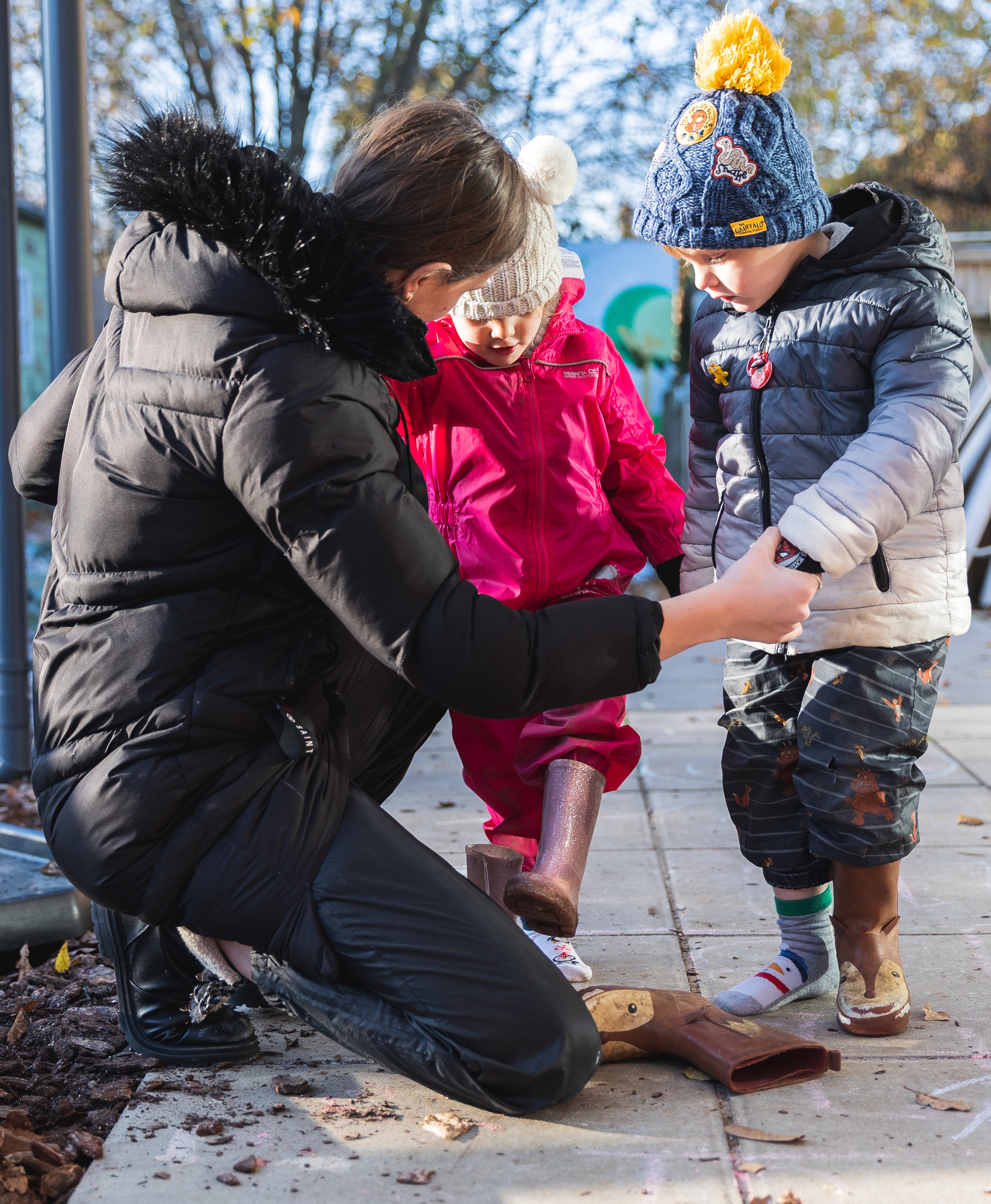
Side Quote Color:
Maths in everyday routines
Everyday routines and activities are full of maths! They include lots of opportunities for your baby or child to explore numbers, counting, space, shapes, patterns, sorting and matching.
The conversations that you have with your child at these times are often rich in maths language – these will help your child to understand maths ideas as well as the words used to describe them.
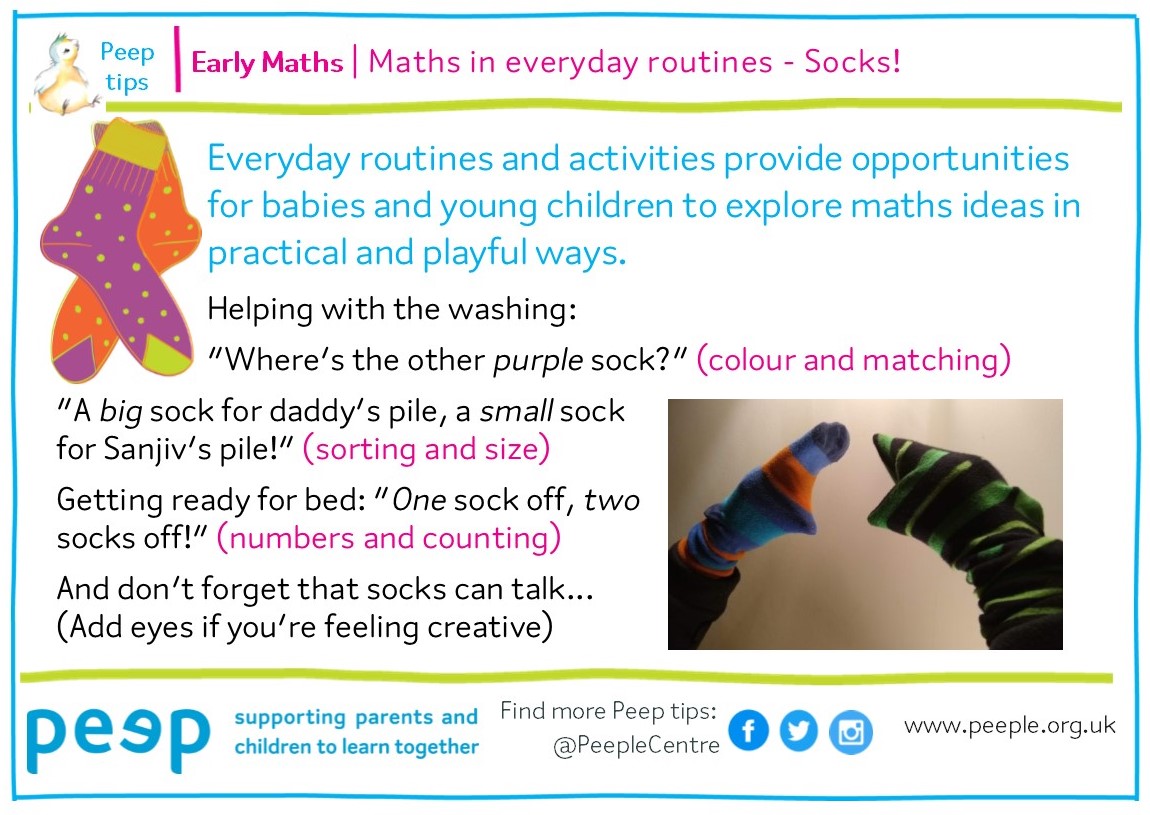
Feature box colour:
Side Quote Color:
Intergenerational Peep: Aberdeen
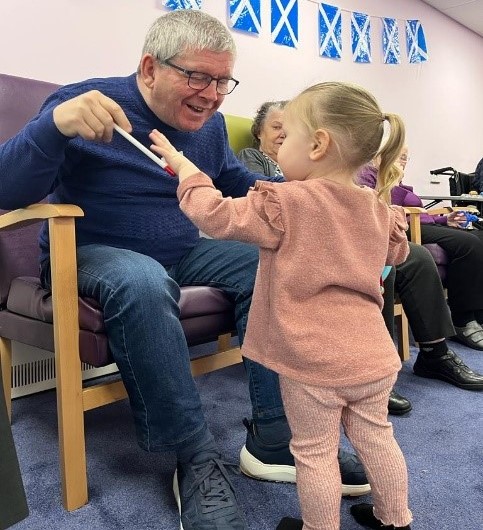 Intergenerational Peep in a day centre or care home for older people is like a typical Peep group but with icing on top – all the usual fun and learning benefits for children, parents, carers and practitioners, but with an extra layer of local older participants. Here’s an insight from Peep practitioners in Aberdeen:
Intergenerational Peep in a day centre or care home for older people is like a typical Peep group but with icing on top – all the usual fun and learning benefits for children, parents, carers and practitioners, but with an extra layer of local older participants. Here’s an insight from Peep practitioners in Aberdeen:
"Peep Aberdeen recognised the opportunity of coming together with the older adults in our communities and the benefits intergeneration Peep could have for the participants. We partnered up with Bon-Accord Care to create an age inclusive Peep group whereby toddlers and older adults alike can make social connections to enhance their well‑being and self-confidence.
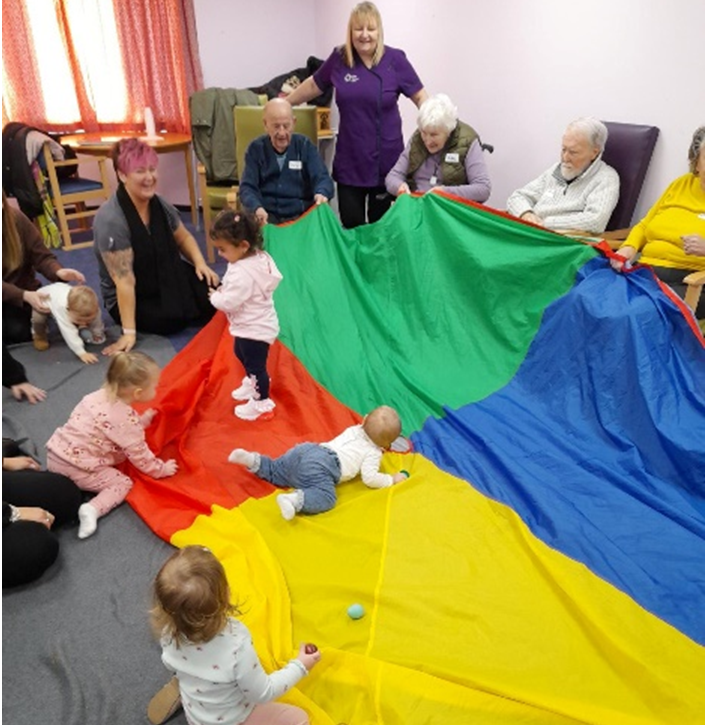 The group has been running with great success for the past six weeks. Over this time we have explored a range of topics from our Peep Learning Together programme including Musical interactions and Balance and co-ordination. We celebrated Valentine’s Day and Burns Night with some crafts which everyone enjoyed. Most recently we practised our balance and co-ordination, walking along the balance beam and throwing beanbags into the box. Both children and adults showed fantastic support and encouragement to one another during the activities.
The group has been running with great success for the past six weeks. Over this time we have explored a range of topics from our Peep Learning Together programme including Musical interactions and Balance and co-ordination. We celebrated Valentine’s Day and Burns Night with some crafts which everyone enjoyed. Most recently we practised our balance and co-ordination, walking along the balance beam and throwing beanbags into the box. Both children and adults showed fantastic support and encouragement to one another during the activities.
During each session we share lots of songs, including classic nursery rhymes our older adults remember from their own childhood.
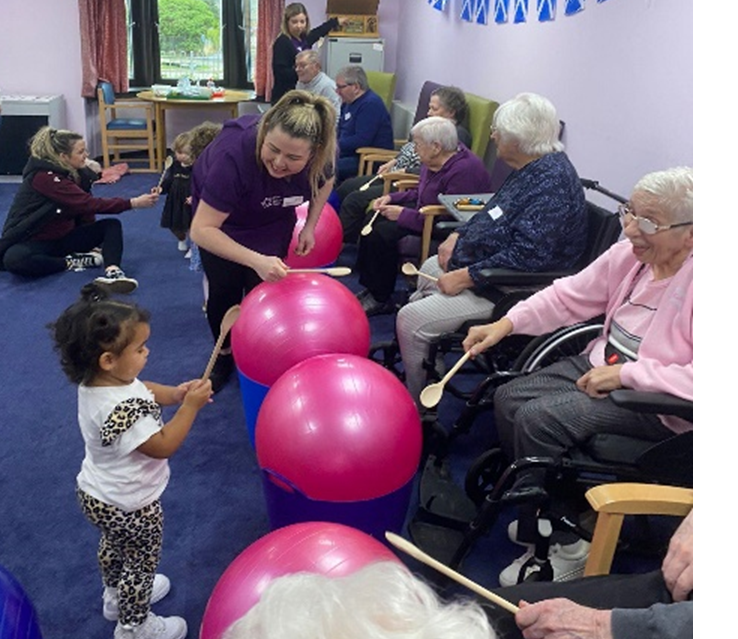 Following our busy activities, we gather around and listen to a story, which one of our older friends enjoys reading to everyone."
Following our busy activities, we gather around and listen to a story, which one of our older friends enjoys reading to everyone."
'Love the group, it's great for the community' - parent
'I have had a great day, I am so happy to see the children' - older adult
'So nice to see children interacting with the older generation' - parent
'Coming together singing familiar songs is my favourite bit' - older adult
'We adore our intergenerational Peep group! It's by far our favourite group of the week. My daughter is very sociable but she has come on leaps and bounds since attending Peep. She gets to play and chat with her friends and so do us mums, it's just great. I enjoy my cup of tea with the residents after the class and it feels like I’m having a catch up with friends. We would come everyday if we could.' - parent
“Intergenerational practice is inclusive, building on the positive resources that the younger and older persons have to offer to each other and those around them.”
Beth Johnson Foundation (a charity dedicated to making the UK age-friendly)
Feature box colour:
Infographic: thanks to Global Intergenerational Week Ireland (www.giwireland.com)
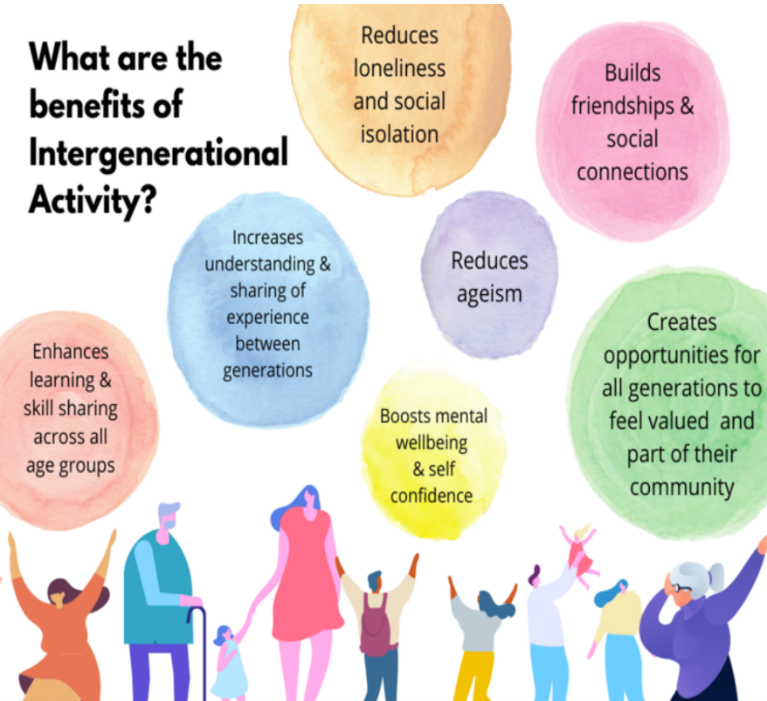
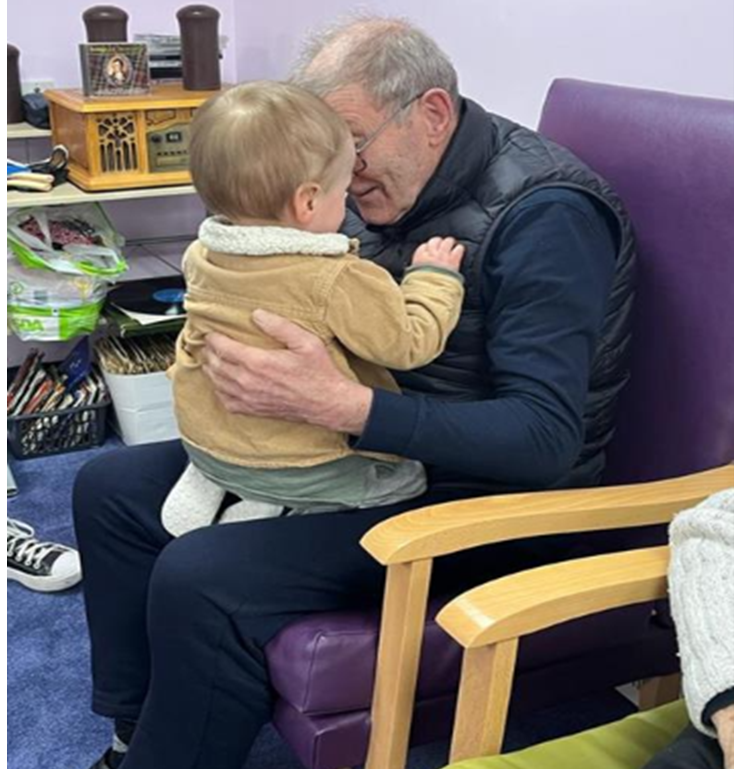
Side Quote Color:
how to share Peep handouts with families
Peep Tips and Things To Do at Home (TDAH) handouts:
You're welcome to share the Peep Tips and Things to do at home (TDAH) activity ideas online or to print them. We continue to add more to the topic toolboxes and TDAH webpage (log-in area) - as PDFs (for printing) and images (JPEGs or PNGs for sharing online).
We often share Peep Tips or TDAHs on our Facebook, Instagram and Twitter/ X pages (all @PeepleCentre) and in the public Parents Area on the website. You're welcome to share posts or encourage parents and carers to follow us - our social media pages are for practitioners and families. You can also share Peep Tips and TDAHs directly on your own social media pages if you prefer - you're welcome to tag us, we love to see what's happening with Peep in different places!
LTP Topic Handouts:
If you want to share a Peep LTP Topic Handout online (the 4-page A5 folded leaflets sharing the topic content with parents), please only share it with the local families you work with, e.g. via email or on a closed social media group page, Whatsapp group, or online learning journal such as Tapestry. As you know, the Programme is at the heart of our work as a charity supporting parents and carers with their children’s learning, and we really appreciate your support in protecting it in this way. It helps protect the copyright of the Peep Learning Together Programme.
Peep songs and Peep the Parrot storybook: find out more about copyright and sharing here.
If you have any questions or suggestions for more tips or handouts, please drop us a line: support@peeple.org.uk











